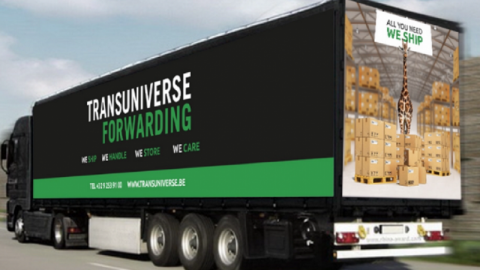
Ekol and Transuniverse to build “mega” multimodal site in North Sea Port
The Turkish logistics company Ekol Logistics and the Belgian groupage firm Transuniverse Forwarding have signed an agreement to build a 40-hectare multimodal site at the Kluizendok in Ghent, which is part of North Sea Port. The new site will include a cross-docking platform, rail terminal and ro/ro terminal.
Ekol Logistics and Transuniverse Forwarding recently signed a letter of intent with North Sea Port to develop this new site. The aim is to grow the terminal into an intermodal hub for cargo flows between the Mediterranean, Eastern Europe and North-West Europe.
For Transuniverse Forwarding, the agreement means a major capacity expansion in the Belgian port, where it already operates a so-called cross-dock centre in Ghent for its groupage shipments to and from the whole of Europe, North Africa and the Middle East. Due to strong growth over recent years, however, this 8,000 m² facility has become insufficient.
“We have taken an option to build a new 20,000 m² cross-dock centre on a site covering 10 hectares,” says Frank Adins, chairman of Transuniverse Forwarding Group. “According to the preliminary plans, the building will be more than 300 metres long and 60 metres wide and will number 140 loading docks/loading platforms. Because it is so big, some of the transhipment there will be automated or robotised.” The new transhipment building is planned to be operational by the end of 2021.
Ro/ro
Because the containers and trailers heading for the United Kingdom will be moved by ship, Ekol Logistics and Transuniverse are also building a ro-ro terminal building at the head of Kluizendok. “This terminal will be operated by a third party. Negotiations are already underway”, says Adins. “The growth opportunities for cargo transhipment between Ghent and the United Kingdom are considerable. Brexit is expected to cause major congestion in the Channel ports. This will create opportunities to organise transport by ship to more northerly ports in the United Kingdom, in conjunction with rail connections to and from the European hinterland.”
Transuniverse currently handles around 100 trucks and intermodal containers per week in Ghent. Thanks to the new facility, the company expects to double these activities within five years. Every week, 20 Ekol trains will depart from the railway terminal in North Sea Port, linking the port to the European hinterland.
CEO Daan Schalck of North Sea Port said these developments “are very much in line” with the port’s objectives. The port aims to further develop Kluizendok as a multimodal logistics hub in Europe. “In addition, North Sea Port is encouraging companies to make increasing use of sustainable modes of transport such as rail and water. We expect that this development will make a significant contribution to that”, he says.




